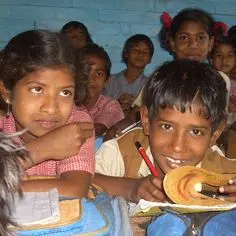
Social and Employment
Project leader
Groupe Développement
Place
West Bengal and Andhra Pradesh, India
Sponsor
Promod Mitroo
Grant(s)
32,000 € to the Selection Committee at 2007/10/02
"The Sanjog project is aimed to provide answers to a real problem and has drawn up a practical action plan to improve the life of extremely vulnerable young girls, belonging to the poorest levels of society. I am convinced that it will achieve excellent results."
Promod Mitroo
India, like many other countries, remains a highly patriarchal society, particularly in the countryside. The girls are considered to be economic burdens to their parents, since tradition demands that the girls be married with a dowry for the family of the future spouse. Hence their education is often limited to the strict minimum, and their parents tend to marry them off as soon as possible, in order to avoid having to continue to pay for a "useless" mouth. In certain very poor regions, they are the ideal prey for racketeers who buy them from their families in order to - so they say - find a husband in the town, whereas they are actually destined for prostitution or other types of economic exploitation (domestic service approaching slavery, for example).
2000 young girls concerned
Groupe Développement, an international outreach association, is thoroughly familiar with this issue, having been operating for several years in Asia, South America and Africa. Working with 10 local NGOs, it has mounted a project - Sanjog - to help young girls of the two states of West Bengal and Andhra Pradesh to reject this situation.
Eight mutual aid groups, assembling about 28 young girls each, are organized in Andhra Pradesh, and 72 in West Bengal. The participants take literacy courses, receive training to build assurance, develop their personal capacities, and they participate in a lobbying program to learn to put pressure on the regional governmental bodies and on the municipalities. The aim is to turn them into citizens capable of mobilizing so that the laws governing their safety and protection from sexual enslavement and forced labor are really enforced.
In addition to this, they are offered a microcredit program, supplemented with an initiation into entrepreneurship and vocational training according to their centers of interest. It is in this framework that the Veolia foundation is acting: its financial grant will help to acquire information technology hardware, tools and supplies for courses in dressmaking and embroidery, for the production of incense and tourist objects and, ultimately, to develop animal breeding activities.
Under the responsibility of a general coordinator based in Delhi, about a hundred adult staff members will be recruited to guarantee the deployment and success of this program, which is expected to change the future of these adolescents.

